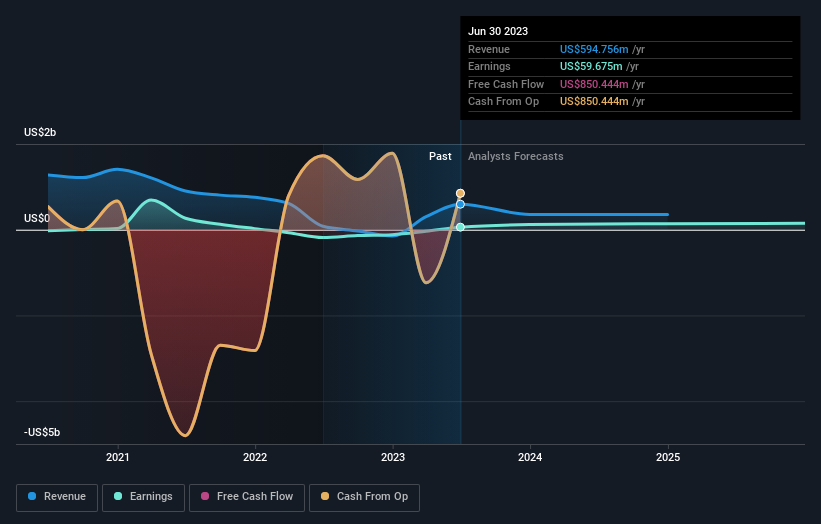- United States
- /
- Mortgage REITs
- /
- NYSE:PMT
Investors more bullish on PennyMac Mortgage Investment Trust (NYSE:PMT) this week as stock advances 4.8%, despite earnings trending downwards over past five years

PennyMac Mortgage Investment Trust (NYSE:PMT) shareholders should be happy to see the share price up 14% in the last quarter. But if you look at the last five years the returns have not been good. After all, the share price is down 34% in that time, significantly under-performing the market.
On a more encouraging note the company has added US$53m to its market cap in just the last 7 days, so let's see if we can determine what's driven the five-year loss for shareholders.
See our latest analysis for PennyMac Mortgage Investment Trust
There is no denying that markets are sometimes efficient, but prices do not always reflect underlying business performance. One imperfect but simple way to consider how the market perception of a company has shifted is to compare the change in the earnings per share (EPS) with the share price movement.
During five years of share price growth, PennyMac Mortgage Investment Trust moved from a loss to profitability. Most would consider that to be a good thing, so it's counter-intuitive to see the share price declining. Other metrics may better explain the share price move.
The most recent dividend was actually lower than it was in the past, so that may have sent the share price lower. The revenue decline of about 12% per year might also encourage sellers.
The graphic below depicts how earnings and revenue have changed over time (unveil the exact values by clicking on the image).

We consider it positive that insiders have made significant purchases in the last year. Having said that, most people consider earnings and revenue growth trends to be a more meaningful guide to the business. This free report showing analyst forecasts should help you form a view on PennyMac Mortgage Investment Trust
What About Dividends?
When looking at investment returns, it is important to consider the difference between total shareholder return (TSR) and share price return. The TSR incorporates the value of any spin-offs or discounted capital raisings, along with any dividends, based on the assumption that the dividends are reinvested. Arguably, the TSR gives a more comprehensive picture of the return generated by a stock. We note that for PennyMac Mortgage Investment Trust the TSR over the last 5 years was 12%, which is better than the share price return mentioned above. And there's no prize for guessing that the dividend payments largely explain the divergence!
A Different Perspective
PennyMac Mortgage Investment Trust shareholders are up 2.5% for the year (even including dividends). Unfortunately this falls short of the market return. The silver lining is that the gain was actually better than the average annual return of 2% per year over five year. This suggests the company might be improving over time. While it is well worth considering the different impacts that market conditions can have on the share price, there are other factors that are even more important. For instance, we've identified 2 warning signs for PennyMac Mortgage Investment Trust (1 shouldn't be ignored) that you should be aware of.
PennyMac Mortgage Investment Trust is not the only stock insiders are buying. So take a peek at this free list of growing companies with insider buying.
Please note, the market returns quoted in this article reflect the market weighted average returns of stocks that currently trade on American exchanges.
New: Manage All Your Stock Portfolios in One Place
We've created the ultimate portfolio companion for stock investors, and it's free.
• Connect an unlimited number of Portfolios and see your total in one currency
• Be alerted to new Warning Signs or Risks via email or mobile
• Track the Fair Value of your stocks
Have feedback on this article? Concerned about the content? Get in touch with us directly. Alternatively, email editorial-team (at) simplywallst.com.
This article by Simply Wall St is general in nature. We provide commentary based on historical data and analyst forecasts only using an unbiased methodology and our articles are not intended to be financial advice. It does not constitute a recommendation to buy or sell any stock, and does not take account of your objectives, or your financial situation. We aim to bring you long-term focused analysis driven by fundamental data. Note that our analysis may not factor in the latest price-sensitive company announcements or qualitative material. Simply Wall St has no position in any stocks mentioned.
About NYSE:PMT
PennyMac Mortgage Investment Trust
Through its subsidiary, primarily invests in residential mortgage-related assets in the United States.
Moderate with moderate growth potential.
Similar Companies
Market Insights
Community Narratives




